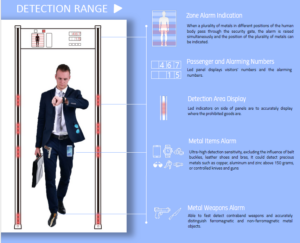Security gantries people scanner
Millimeter-wave detectors for metals, ceramics, powders, liquids, colloids, glass and other items for all public areas
Millimeter-wave body scanner:“THE“modern, state-of-the-art, unstoppable solution for securing spaces.
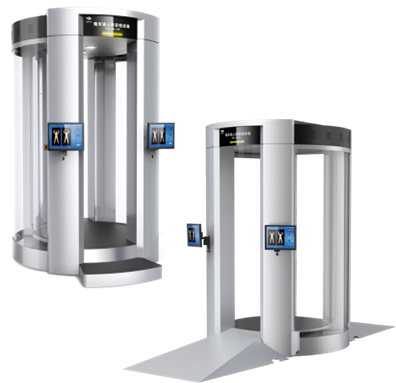
High-performance, three-dimensional circular scanning technology can effectively cover the whole body, especially both sides.
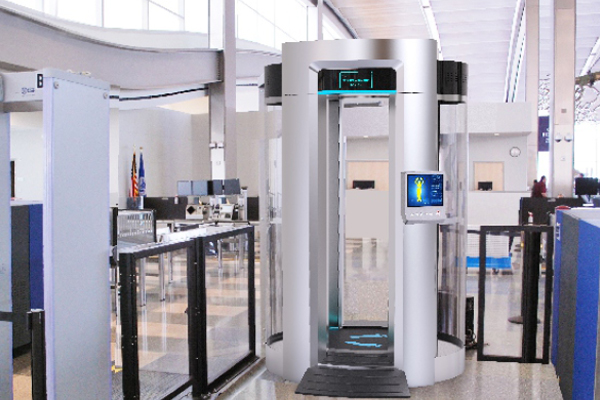
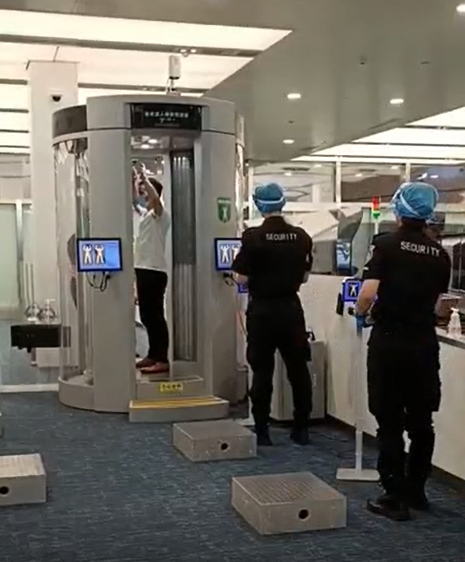
This millimeter-wave technology can be used perfectly with specific boxes (which we also sell) for any access solution, such as parking barriers, pedestrian entrances, etc.
… and of course with our access control solutions.
Millimeter-wave body scanner: safety, efficiency and cutting-edge technology
Millimeter-wave body scanners represent a major advance in the field of security and the detection of prohibited objects.
These innovative devices provide fast, non-intrusive, health-friendly safety checks.
Thanks to millimeter-wave technology, they offer exceptional performance in detecting objects hidden under clothing, while preserving individual privacy.
How do millimeter-wave body scanners work?
Millimeter-wave scanners use very high frequency radio waves to create an image of the element detected on the human body.
Unlike X-ray scanners, they present no health risk, as millimeter waves are neither ionizing nor dangerous.
The detection process is fast, painless and requires no form of physical contact, guaranteeing a smooth, comfortable experience for passengers or visitors.
Why choose a millimeter-wave body scanner?
Enhanced security: These scanners enable ultra-precise detection of metallic, non-metallic and even organic objects, guaranteeing maximum security in airports, stadiums or any other public place with a high flow of people.
Privacy respected: the technology does not create detailed body images, thus preserving individual privacy while ensuring effective security.
Speed and efficiency: millimeter-wave body scanners offer real-time detection, enabling large numbers of people to be processed quickly without disrupting the flow of visitors.
Compliance with international standards: these scanners comply with strict safety regulations and are certified by the relevant authorities.
Applications for millimeter-wave body scanners
Millimetre-wave body scanners are used in a variety of sectors:
- Airports and railway stations: for passenger screening and threat prevention.
- Public events and stadiums: to ensure spectator safety.
- Government buildings and sensitive areas: for secure access without compromising on speed.
Investing in a millimetre-wave body scanner: a modern, reliable solution
When you choose a millimeter-wave body scanner, you’re opting for advanced security technology that respects privacy and complies with international security standards.
Our solutions are designed to offer you optimum security, while guaranteeing unrivalled ease of use. Discover our range of millimeter-wave scanners today to enhance the security of your installations!
This technology is also known asTeraHertz“Click on this link for a scientific explanation.
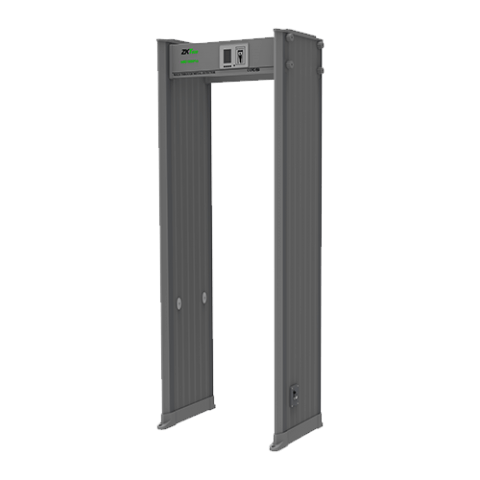
- 18 detection zones
- IP65:totally dust tight and protected against water projected from a nozzleSynchronous sound & LED alarm
- Audio and visual alarm
- 256 sensitivity levels
- 3.5” LCD display
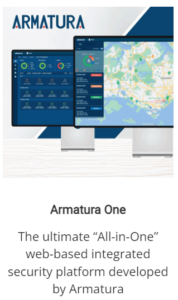
- TCP/IP communication
- Compatible with smart security gates of ZKTeco
- Remote control via WTMD App
- Simple installation and operation
- Dimensions: 2229×816×554 | 2002×704×488 | IP65
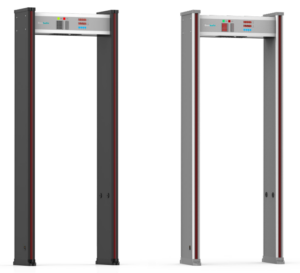
Security gates, secure pedestrian access, metal detectors
They are omnipresent in our modern society, playing an essential role in preserving safety and security. These devices, often found in airports, train stations, shopping centers and other public places, have evolved to become vigilant guardians, ensuring the protection of individuals and property.Featuring sophisticated technology, security gates are designed to detect a diverse range of potentially dangerous objects. Scanners and integrated metal detectors help identify weapons and other unwanted metal objects, while explosive detection devices help prevent more insidious threats.
- Preventing terrorist threats: Public spaces are often potential targets for terrorist attacks. Secure pedestrian access, equipped with security gates and other control devices, helps deter malicious acts and minimize risks.
- Weapons and dangerous objects control: Security gates are designed to detect firearms, knives and other potentially dangerous objects. By limiting the introduction of these objects into public spaces, the potential for violence is significantly reduced.
- Protecting people and property: Secure pedestrian access helps to ensure the safety of people and property by preventing the entry of unauthorized or potentially malicious persons. This is particularly crucial in sensitive locations such as airports, train stations, stadiums and government institutions.
- Managing the flow of people: By regulating pedestrian access, we can better manage the flow of people in busy areas, avoiding overcrowding and facilitating rapid evacuation in the event of an emergency.
- Compliance with safety standards: In many cases, the provision of safe pedestrian access is a regulatory requirement to ensure compliance with current safety standards. This is particularly evident in the transportation, critical infrastructure and public events sectors.
- Protecting sensitive information: In some institutions, secure pedestrian access is necessary to protect sensitive and confidential information. This may include government facilities, high-tech companies or research centers.
Millimeter-wave body scanner.
The modern, state-of-the-art, unstoppable solution for securing spaces.
High-performance, three-dimensional circular scanning technology can effectively cover the whole body, especially both sides.
This millimeter-wave technology can be used perfectly with specific boxes (which we also sell) for any access solution, such as parking barriers, pedestrian entrances, etc.
… and of course with our access control solutions.
Millimeter-wave body scanner: safety, efficiency and cutting-edge technology
Millimeter-wave body scanners represent a major advance in the field of security and the detection of prohibited objects.
These innovative devices provide fast, non-intrusive, health-friendly safety checks.
Thanks to millimeter-wave technology, they offer exceptional performance in detecting objects hidden under clothing, while preserving individual privacy.
Read more
Close
How do millimeter-wave body scanners work?
Millimeter-wave scanners use very high frequency radio waves to create an image of the element detected on the human body.
Unlike X-ray scanners, they present no health risk, as millimeter waves are neither ionizing nor dangerous.
The detection process is fast, painless and requires no form of physical contact, guaranteeing a smooth, comfortable experience for passengers or visitors.
Why choose a millimeter-wave body scanner?
Enhanced security: These scanners enable ultra-precise detection of metallic, non-metallic and even organic objects, guaranteeing maximum security in airports, stadiums or any other public place with a high flow of people.
Privacy respected: the technology does not create detailed body images, thus preserving individual privacy while ensuring effective security.
Speed and efficiency: millimeter-wave body scanners offer real-time detection, enabling large numbers of people to be processed quickly without disrupting the flow of visitors.
Compliance with international standards: these scanners comply with strict safety regulations and are certified by the relevant authorities.
Applications for millimeter-wave body scanners
Millimetre-wave body scanners are used in a variety of sectors:
- Airports and railway stations: for passenger screening and threat prevention.
- Public events and stadiums: to ensure spectator safety.
- Government buildings and sensitive areas: for secure access without compromising on speed.
Investing in a millimetre-wave body scanner: a modern, reliable solution
When you choose a millimeter-wave body scanner, you’re opting for advanced security technology that respects privacy and complies with international security standards.
Our solutions are designed to offer you optimum security, while guaranteeing unrivalled ease of use. Discover our range of millimeter-wave scanners today to enhance the security of your installations!
This technology is also known asTeraHertz“Click on this link for a scientific explanation.
Security gates, secure pedestrian access, metal detectors
They are omnipresent in our modern society, playing an essential role in preserving safety and security. These devices, often found in airports, train stations, shopping centers and other public places, have evolved to become vigilant guardians, ensuring the protection of individuals and property.
Featuring sophisticated technology, security gates are designed to detect a diverse range of potentially dangerous objects. Scanners and integrated metal detectors help identify weapons and other unwanted metal objects, while explosive detection devices help prevent more insidious threats.
Read more
Close
Beyond their primary function of preventing malicious acts, security gates also facilitate the efficient flow of people through various environments. They thus help to maintain a delicate balance between the need to strengthen security and the desire to preserve the convenience and fluidity of travel.
However, the widespread use of security gates also raises questions about privacy and individual liberty. The challenge is to find a delicate balance between the need to guarantee collective security and respect for the fundamental rights of each individual. In short, security gates embody a technological response to the increasing complexity of contemporary threats. Their presence symbolizes our commitment to collective protection while sparking continued reflection on how to harmonize security and freedom in our modern society.
They can be combined with our access control
- 18 detection zones
- IP65:totally dust tight and protected against water projected from a
nozzleSynchronous sound & LED alarm - Audio and visual alarm
- 256 sensitivity levels
- 3.5” LCD display
- TCP/IP communication
- Compatible
with smart security gates of ZKTeco - Remote control via WTMD App
- Simple installation and operation
- Dimensions: 2229×816×554 | 2002×704×488 | IP65

Safe pedestrian access plays a crucial role in preserving public and individual safety. There are a number of reasons why safe pedestrian access systems are needed in a variety of public and private environments.
- Preventing terrorist threats: Public spaces are often potential targets for terrorist attacks. Secure pedestrian access, equipped with security gates and other control devices, helps deter malicious acts and minimize risks.
- Weapons and dangerous objects control: Security gates are designed to detect firearms, knives and other potentially dangerous objects. By limiting the introduction of these objects into public spaces, the potential for violence is significantly reduced.
- Protecting people and property: Secure pedestrian access helps to ensure the safety of people and property by preventing the entry of unauthorized or potentially malicious persons. This is particularly crucial in sensitive locations such as airports, train stations, stadiums and government institutions.
- Managing the flow of people: By regulating pedestrian access, we can better manage the flow of people in busy areas, avoiding overcrowding and facilitating rapid evacuation in the event of an emergency.
- Compliance with safety standards: In many cases, the provision of safe pedestrian access is a regulatory requirement to ensure compliance with current safety standards. This is particularly evident in the transportation, critical infrastructure and public events sectors.
- Protecting sensitive information: In some institutions, secure pedestrian access is necessary to protect sensitive and confidential information. This may include government facilities, high-tech companies or research centers.
In short, pedestrian access secured by security gates and metal detectors helps create an environment where people can move around with confidence, knowing that effective measures are in place to minimize potential risks. However, it is essential to find a balance between security and respect for individual rights in order to avoid any excess or invasion of privacy.
